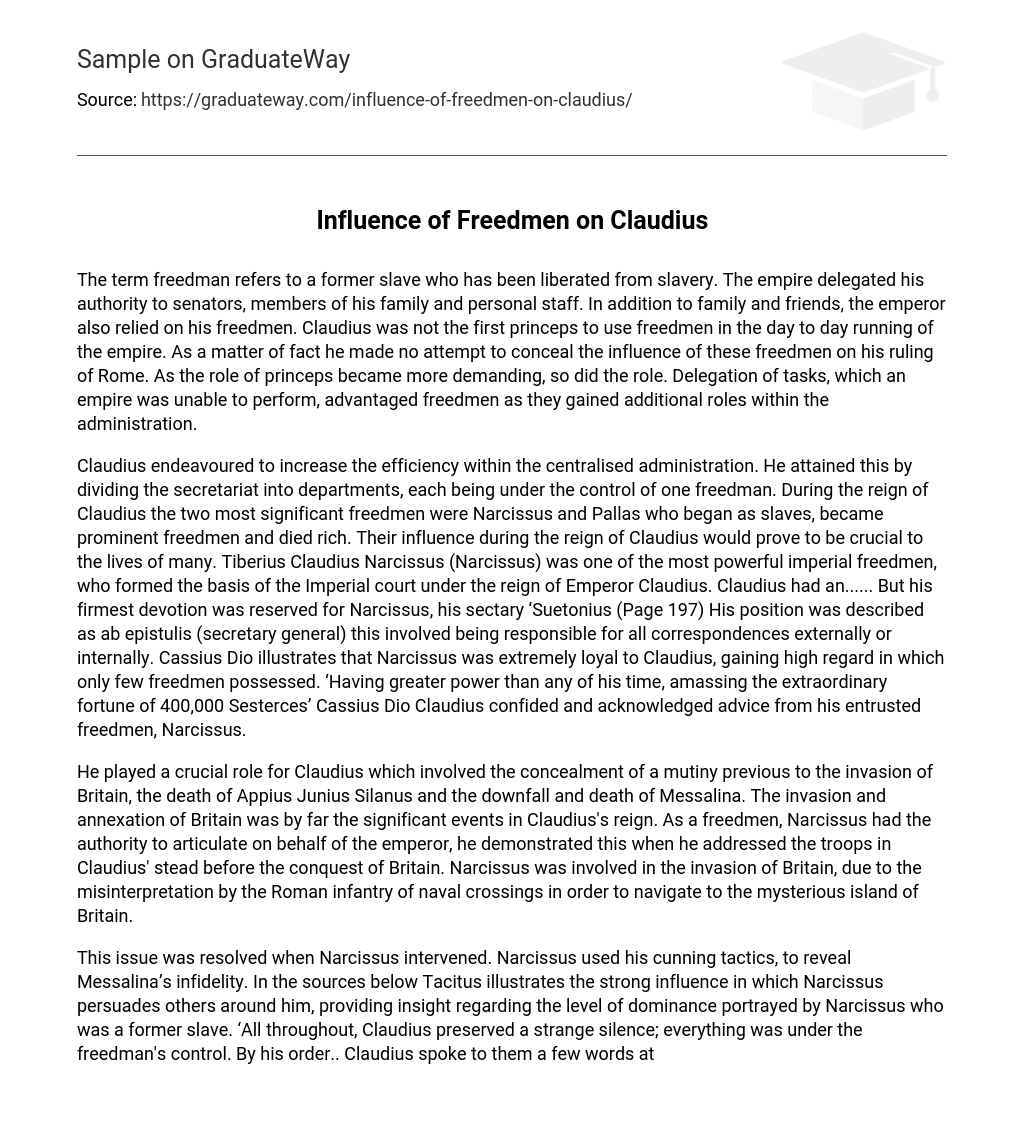The term freedman refers to a former slave who has been liberated from slavery. The empire delegated his authority to senators, members of his family and personal staff. In addition to family and friends, the emperor also relied on his freedmen. Claudius was not the first princeps to use freedmen in the day to day running of the empire. As a matter of fact he made no attempt to conceal the influence of these freedmen on his ruling of Rome. As the role of princeps became more demanding, so did the role. Delegation of tasks, which an empire was unable to perform, advantaged freedmen as they gained additional roles within the administration.
Claudius endeavoured to increase the efficiency within the centralised administration. He attained this by dividing the secretariat into departments, each being under the control of one freedman. During the reign of Claudius the two most significant freedmen were Narcissus and Pallas who began as slaves, became prominent freedmen and died rich. Their influence during the reign of Claudius would prove to be crucial to the lives of many. Tiberius Claudius Narcissus (Narcissus) was one of the most powerful imperial freedmen, who formed the basis of the Imperial court under the reign of Emperor Claudius. Claudius had an…… But his firmest devotion was reserved for Narcissus, his sectary ‘Suetonius (Page 197) His position was described as ab epistulis (secretary general) this involved being responsible for all correspondences externally or internally. Cassius Dio illustrates that Narcissus was extremely loyal to Claudius, gaining high regard in which only few freedmen possessed. ‘Having greater power than any of his time, amassing the extraordinary fortune of 400,000 Sesterces’ Cassius Dio Claudius confided and acknowledged advice from his entrusted freedmen, Narcissus.
He played a crucial role for Claudius which involved the concealment of a mutiny previous to the invasion of Britain, the death of Appius Junius Silanus and the downfall and death of Messalina. The invasion and annexation of Britain was by far the significant events in Claudius’s reign. As a freedmen, Narcissus had the authority to articulate on behalf of the emperor, he demonstrated this when he addressed the troops in Claudius’ stead before the conquest of Britain. Narcissus was involved in the invasion of Britain, due to the misinterpretation by the Roman infantry of naval crossings in order to navigate to the mysterious island of Britain.
This issue was resolved when Narcissus intervened. Narcissus used his cunning tactics, to reveal Messalina’s infidelity. In the sources below Tacitus illustrates the strong influence in which Narcissus persuades others around him, providing insight regarding the level of dominance portrayed by Narcissus who was a former slave. ‘All throughout, Claudius preserved a strange silence; everything was under the freedman’s control. By his order.. Claudius spoke to them a few words at the dictation of Narcissus. ’ Tactius (Page 249) ‘Had not Narcissus hurried on her death…. Narcissus rushed out, and ordered the centurions and the tribunes, who were on guard, to accomplish the deed of blood’ Tactius (Page 250) Marcus Antonius Pallas (Pallas), the chief of the financial department and administered the profits that were invested into the imperial fiscal treasury. Emperor Claudius’ personal assets and imperial provinces also contributed to the role in which Pallas was responsible for. He amply fulfilled the weight of his position and was recommended to be acknowledged, in the presence of the senate.





